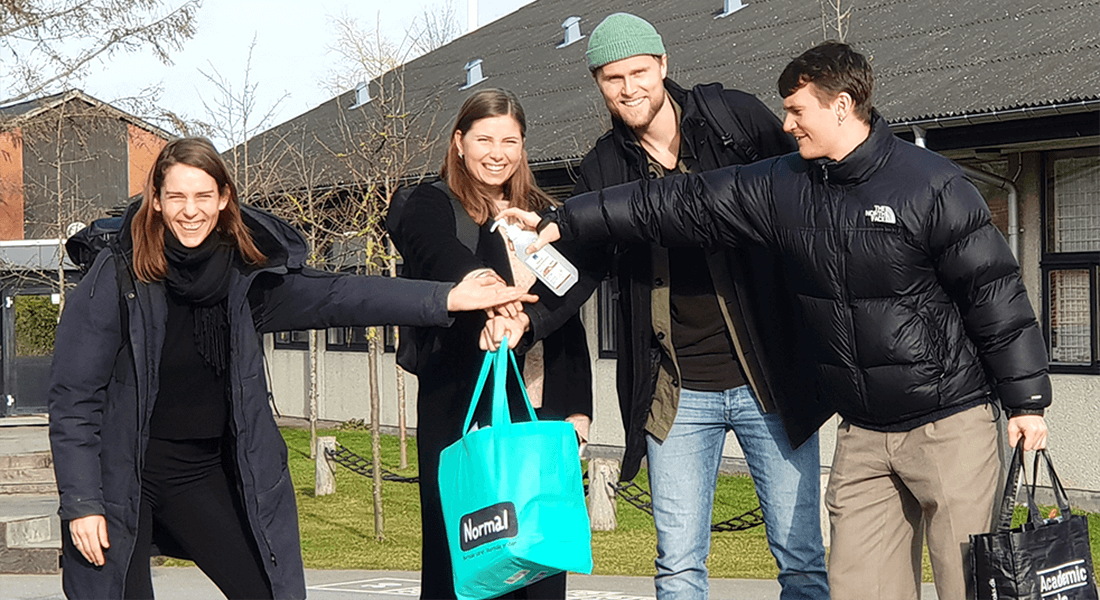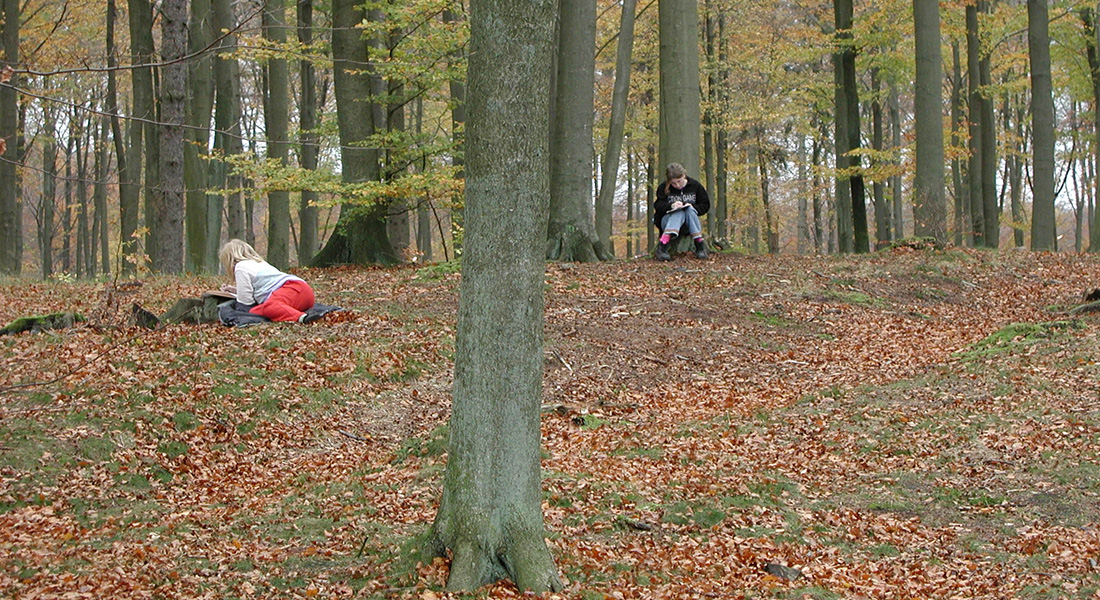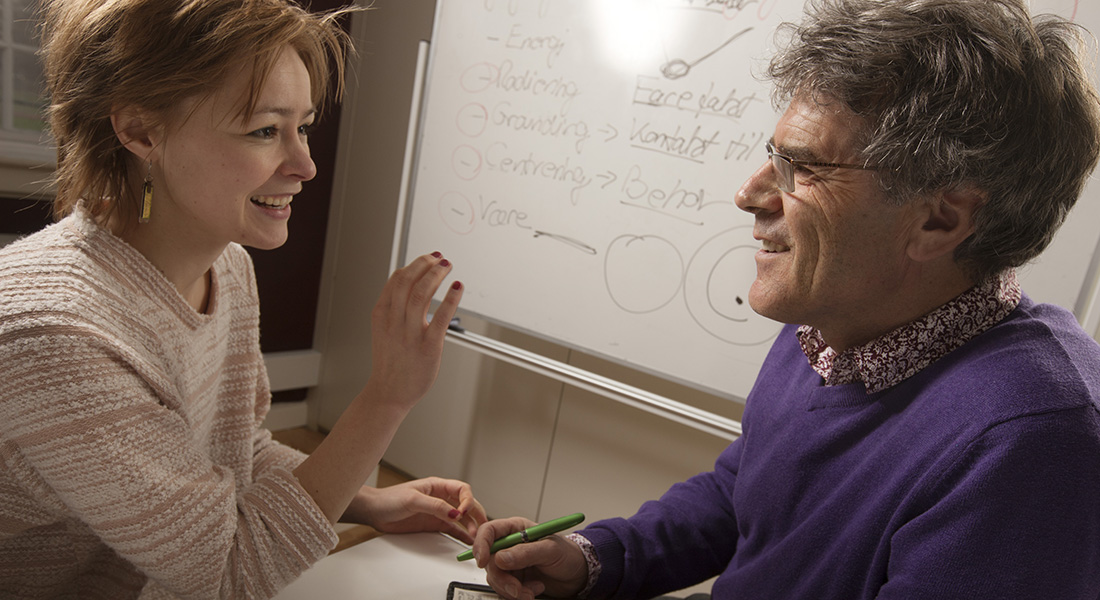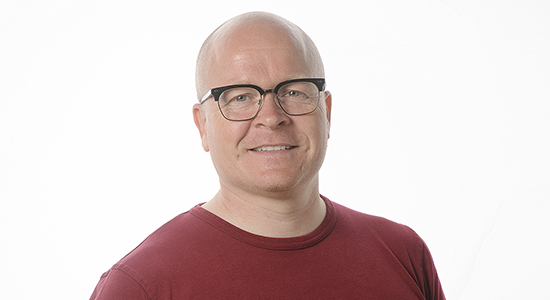A cluster randomized controlled trial of the efficacy and mechanisms of an education outside the classroom intervention on adolescents’ physical activity.
Sport, Individual & Society
The primary research aim of the unit lies in sport promotion. The section therefore focuses upon ensuring meaningful experiences of being active, together with creating opportunities that can accommodate vulnerable target groups so that the general population increases its participation in physical activity.
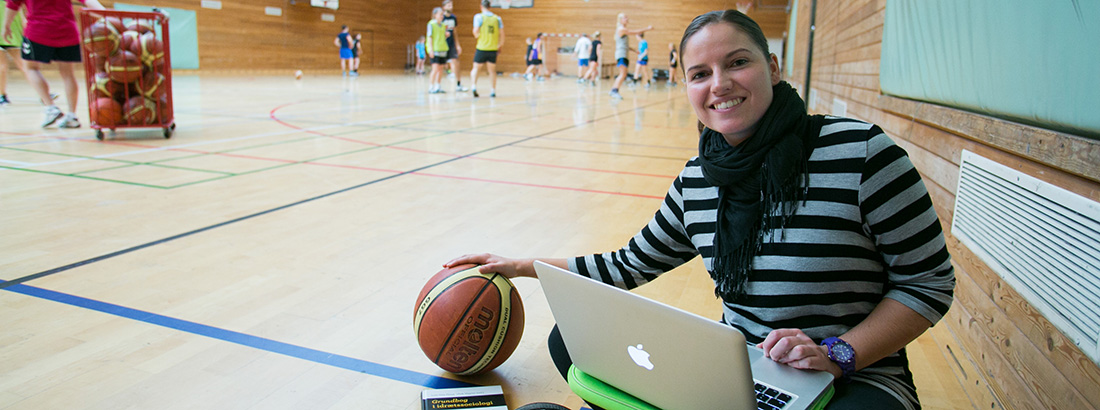
The research of the section aims at promoting sport and movement activities for individuals and in society. It focuses on the importance of creating meaningful experiences, community, and organizational possibilities that also include people in vulnerable positions so that the levels physical activity improve in the whole population.
We investigate the diversity of sport and movement activities. Our research contributes to the understanding of sport, movement activities, and the importance of the body historically, and creates the foundation for future visionary possibilities. Emphasis is on the wider health aspects of sport and movement activities, but also on the pleasure of movement, enjoyment, and citizenship.
The research forms the foundation of our contribution to NEXS educational programmes. The section teaches subjects in the Bachelor degree programme in Sport and Physical Activity, in the Master programme in Social Science and Humanities of Sport and Exercise, and in the Master degree programme in Sport and Welfare.
Our main aim is to be a benchmark contributor to sport and exercise research nationally and internationally, primarily within pedagogics, psychology, and sociology. Our research is therefore anchored in two focused, but complementary, research groups.
The aim of organizing in this way is to ensure and promote a robust academic standard, both theoretically and in terms of applied methods, enabling us to contribute collectively at the highest possible international research level.
The research of the section is linked to professional practices. We therefore collaborate with several sports organizations and with public administration, as well as with actors within teaching and education environments.
In this way, we strive towards that our research creates equality for all in sport and thereby makes a difference for the broader population across age, gender, ethnicity, sexuality, and social or cultural background.
Head of section: Associate professor Laila Ottesen
Section Secretary: Helle Rudolph Jensen
Postal address
Department of Nutrition, Exercise and Sports
Section for Sport, Individual & Society
Nørre Allé 51
DK 2200 Copenhagen N
Denmark
Visiting address
Section for Sport, Individual & Society
Department of Nutrition, Exercise and Sports
Nørre Allé 55
DK 2200 Copenhagen N
Denmark
See overview map of North Campus
Research projects
Movement, learning and social change
This project aims to research, document and develop the dance therapeutic field and develop knowledge and practice about why and how dance movement therapy and other arts-based therapies can be used with a multitude of target groups.
The research field was developed through practical research and international, interdisciplinary and cross-sectoral research collaboration.
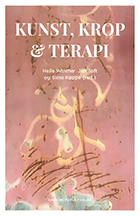 EMBODIMENT, ART AND THERAPY (Danish)
EMBODIMENT, ART AND THERAPY (Danish)
Edited by Helle Winther, Simo Køppe and Jim Toft.
All human experiences are connected with sensory experiences. Life is lived through the body, and it is through the sensitive body that we can have the experience of "finding home." Humans have always sought insight, well-being and emotional freedom through artistic expression. The idea that art, embodiment and therapy are closely connected is not new, and yet this book opens new avenues.
The book portrays forms of therapy that can be used with many target groups. The authors, who are researchers, teachers and practitioners, show, based on theory, research and concrete cases, how the body and art can be used in therapeutic work.
The reader gains insight into internationally established forms of therapy: dance therapy, music therapy, drama therapy, visual art therapy, play therapy and body psychotherapy - and into more recently developed approaches such as writing therapy, nature therapy and family sports in a therapeutic setting.
Funded by
Department of Psychology. University of Copenhagen.
Project period: 2022 - 2026.
Publications
Winther, H. (2023). Danseterapi (DMT) - når livet er i bevægelse. I H. Winther, J. Toft, & S. Køppe (red.), Kunst, Krop og Terapi (s. 51-82). Hans Reitzels Forlag. (Danish)
Winther, H., Toft, J., & Køppe, S. (red.) (2023). Kunst, Krop og Terapi. Hans Reitzels Forlag. (Danish)
Winther, H. (2023). The happiest hour in the week: Memory Dance and Dance Movement Therapy for elderly people living with dementia. I S. Burridge, & C. Svendler Nielsen (red.), Dance On!: Dancing Through Life (s. 216-225). Routledge.
Contact
Research leader Associate Professor Helle Winther
People with dementia often experience memory problems, loss of independence and difficulties in communication.
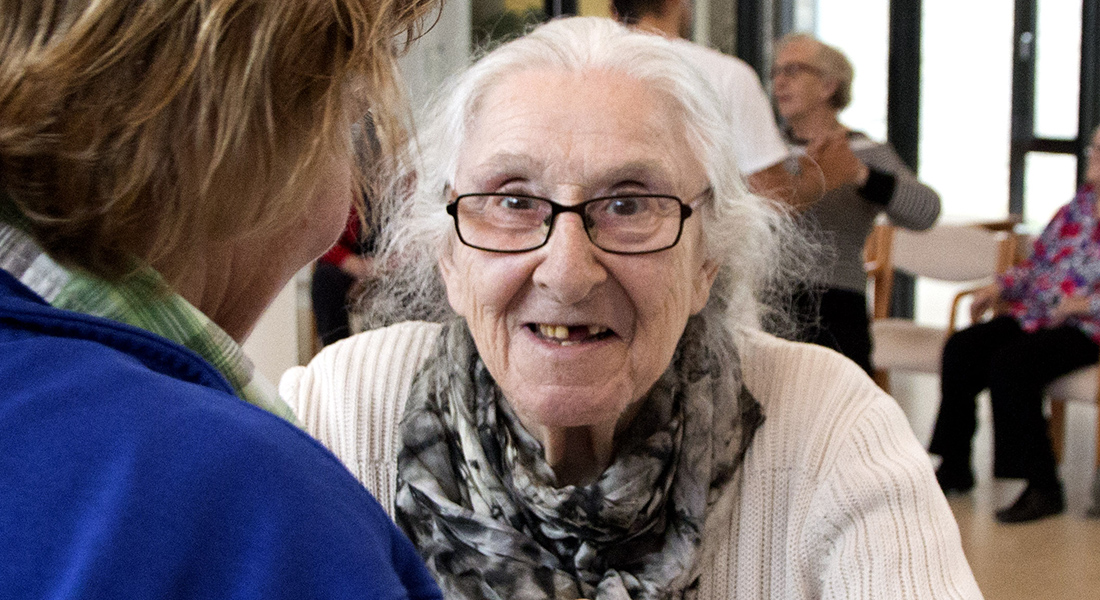
This project investigates how dance can contribute to the joy of movement, movement motivation, and increased social participation for people living with dementia.
Cooperation with Team Sport and Health.
Publication
Winther, H. (2023). The happiest hour in the week: Memory Dance and Dance Movement Therapy for elderly people living with dementia. I S. Burridge, & C. Svendler Nielsen (red.), Dance On!: Dancing Through Life (s. 216-225). Routledge.
Funded by
Nordea-fonden
University of Copenhagen
Project period: 2021 - 2023
Contact
Research leader Associate Professor Helle Winther
Associate Professor Jesper Lundbye-Jensen
Moving Families is a practice-based research project that aims to strengthen the well-being of vulnerable children through a holistic movement effort for refugee families in Red Cross living units.
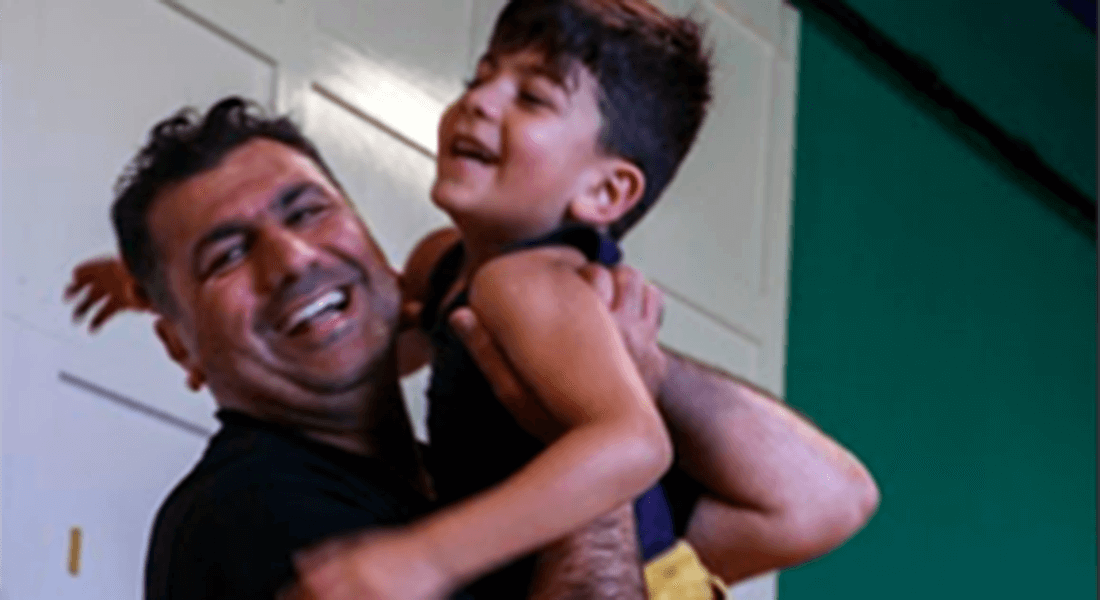
The project examines whether and how play, dance and holistic movement activities can create joy, contact and life-giving attachment processes between children and parents, thus strengthening the well-being of vulnerable children.
Publications
Winther, H., Johansen, M., & Baumgarten, L. G. (2023). Moving Families - bevægelse og leg i en terapeutisk setting. I H. Winther, J. Toft, & S. Køppe (red.), Kunst, Krop og Terapi (s. 307-326). Hans Reitzels Forlag. (Danish)
Baumgarten, L. G., Johansen, M., & Winther, H. (2023). Holistic movement activities with refugee families: the importance of attachment processes. Body, Movement and Dance in Psychotherapy, 18 (1), 4-21.
Funded by
Project period: 2019 - 2025.
Contact
Research leader Associate Professor Helle Winther

This is a holistic movement project for 10-15 year old children in asylum centres. On the Move is based on holistic movement activities that can span across age, cultural background and language skills. The project aims at supporting the children’s physical, psychological, and social development processes.
The project is a unique partnership between the Red Cross Asylum and NEXS with DGI as a collaboration partner. It was developed by closely connecting practice, post-graduate education and research.
Publications
Johansen, M., & Winther, H. (2024). "Vi flyver" - følelser, fordybelse og forbundethed: Fortællinger fra en holistisk legende bevægelsespraksis med børn på asylcentre. MOV:E, 2024(15), 6-22. (Danish)
Winther, H., Johansen, M., Vestergaard- Andersen, L., Baumgarten, L. G., & Askov, M. A. (2024). On The Move: Holistic Playful Movement Activities for Children in Vulnerable Situations. Red Cross Asylum.
Winther, H., Johansen, M., Vestergaard- Andersen, L., Baumgarten, L. G., & Askov, M. A. (2024). On the Move: Helhedsorienterede bevægelsesaktiviteter med børn i sårbare positioner. Røde Kors Asyl. (Danish)
Funded by
Contact
Research leader Associate Professor Helle Winther
PhD student Maise Johansen
Rehabilitation with play and movement activities for pre-school children (1-5 years) with cancer
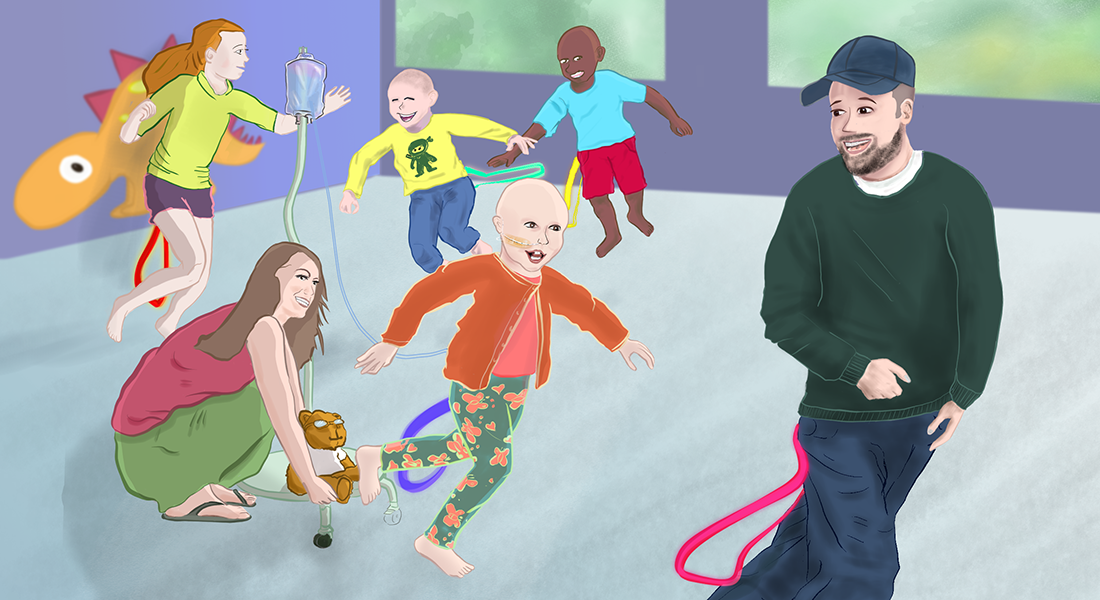
This research project is a rehabilitation project originating from Rigshospitalet's Children's Oncology Laboratory (Bonkolab) in collaboration with the Clinic for Ergo- and Physiotherapy at Rigshospitalet, the Children's Cancer Department at Rigshospitalet and NEXS.
Project RePlay aims to:
- Investigate the effect of a six-month structured, active play intervention aimed towards gross motor function in children with cancer aged 1-5 years, as compared to a control group receiving standard treatment.
- Investigate children with cancer and their parents' experiences with structured, active play during treatment, including the influence on the children's social and personal development.
Publications
Pouplier, Anna ; Larsen, Hanne Bækgaard ; Christensen, Jan ; Schmidt-Andersen, Peter ; Winther, Helle ; Fridh, Martin Kaj. / The rehabilitation including structured active play (RePlay) model: A conceptual model for organizing physical rehabilitation sessions based on structured active play for preschoolers with cancer. I: Frontiers in Pediatrics. 2022 ; Bind 10.
Funded by
Contact
PhD student Anna Pouplier, anna.pouplier@regionh.dk
Associate Professor Helle Winther, PhD supervisor.
This project has both theory-developing, practical and innovative dimensions. It documents how and why movement, play and dance can create flow, community, joy in movement, and personal development in children and young people's learning and development processes.
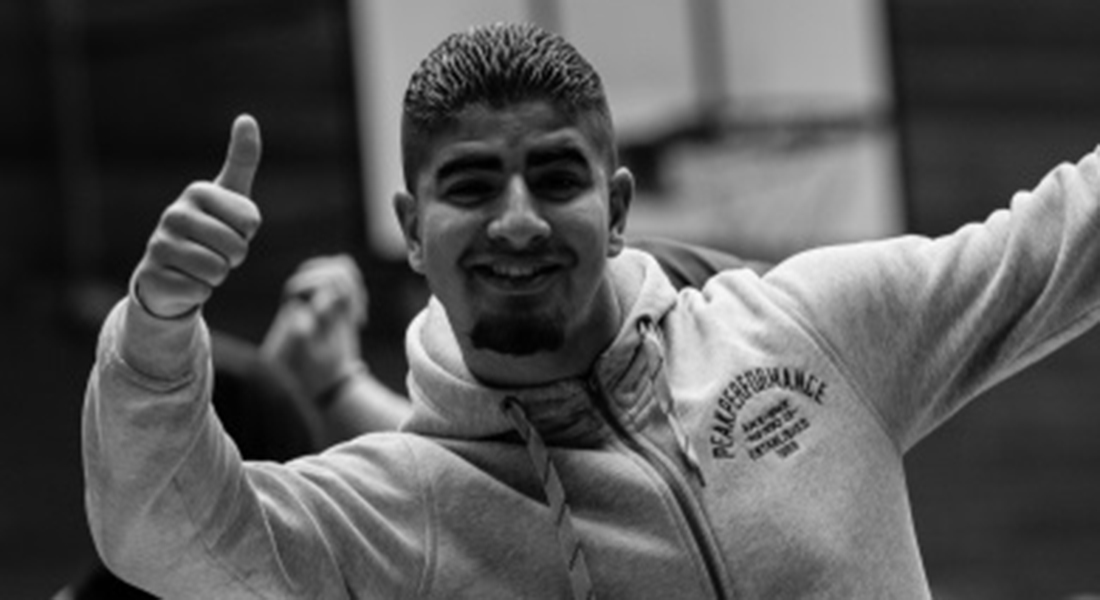
The project is based on a holistic understanding of the body.
In movement psychology, the focus is on the close interaction between the physical, psychological, emotional, social, cultural and spiritual dimensions of movement, which influence the development and well-being of children and young people in communities.
The focus is particularly on how movement can support vulnerable children's emotional processes and bodily resources, thus stimulating positive development. By including the importance of movement, teachers gain insight into the importance of basic emotions in movement education.
Publications
Winther, H. (2022). De syv bevægelsesdimensioner – eksistens og resonans i idrætsundervisningen. GISP, (178), 26-29. (Danish)
Winther, H. (2020). Learn through the body. I Learn Through The Body (s. 4-24). FFDs Forlag. Lessons from the Folk High School Bind 9.
Winther, H. (2017). Bevægelse og flow i børn og unges lære-, være- og udviklingsprocesser: Introduktion til en praksisnær bevægelsespsykologisk teori. Unge Paedagoger, 2017(1), 36-44. (Danish)
Christensen, H., Stavad, S. N., & Winther, H. (2017). Bevægelse mod mobning: Fra negativt klassemiljø til glædesfyldte fællesskaber i folkeskolen. idrottsforum.org, 1-16. (Danish)
Winther, H. (2015). Alle kan danse - improvisation, gruppedynamik og energi. I H. Winther, L. Engel, M-B. Nørgaard, & M. Herskind (red.), Fodfæste og Himmelkys: Undervisningsbog i Bevægelse, Rytmisk Gymnastik og Dans (2. udg., s. 154-178). Billesøe og Baltzer. (Danish)
Winther, H. (2014). Grundfølelsernes liv og funktion i idræts- og bevægelsesundervisning - et allestedsnærværende læringspotentiale. idrottsforum.org, 1-12. (Danish)
Funded by
University of Copenhagen.
Contact
Associate Professor Helle Winther
COMPLETED PROJECT
Project period: 2013 - 2017.
In Outer Nørrebro, a district with a large proportion of people with an ethnic origin other than Danish, this project took its starting point from the daily life of young people, and especially boys from 6th-9th grade at Rådmandsgades School.
The purpose of the project was to challenge the young people to work with "life skills" and active citizenship, so that they actively experience being able to take responsibility for themselves and others in the arenas where they act in everyday life.
This was done by creating a community for the boys around a "common third" (a team game project and coaching/mentoring).
The concepts of life skills, life skills, active citizenship and social cohesion are central to the project, which intends to develop models that can also be used outside "2200 Copenhagen N".
Publications
Ryom, K. (2017). Unge, holdspil og medborgerskab: Det dårlige selskab? Et lokalt aktionsforskningsprojekt på Ydre Nørrebro. Ph.d. afhandling. SL grafik. (Danish)
Ryom, K., Wikman, J. M., & Stelter, R. (2021). Supporting self-concept in school settings targeting migrant background boys. Scandinavian Journal of Educational Research, 65(4), 676-692.
Ryom, K & Stelter, R 2020, 'Motionsfodbold og medborgerskab: Fodbold og samskabelse som ramme for udvikling og medborgerskab hos udsatte drenge', Forum for Idraet, vol. 35, no. 1, pp. 71-82. (Danish)
Ryom, K. E., & Stelter, R. (2018). Idrætspsykologi med et community psykologisk afsæt: Erfaringer fra et socialt eksperiment i København, Danmark. In T. Haugen, & R. Høigaard (Eds.), Trender i Idrettpsykologisk Forskning i Skandinavia (pp. 121-143). Cappelen Damm Akademisk. (Danish)
Ryom, K. E., Maar Andersen, M., & Stelter, R. (2017). Coaching at-risk youth in a school within a socially challenging environment. Improving Schools, 20(2), 143-160.
Ryom, K. E., Stelter, R., & Plannthin, L. (2014). Gruppecoaching og inklusion af udsatte drenge i skolen. Kvan - et tidsskrift for læreruddannelsen og folkeskolen, 34 (100), 78-90. (Danish)
Funded by
Contact
Professor Reinhard Stelter
Physical activities during school and leisure
Project has ended. Period: 2020 - 2023.
A cohort study of conditions in Danish sports associations that promoted young people's well-being and continuation in sports.
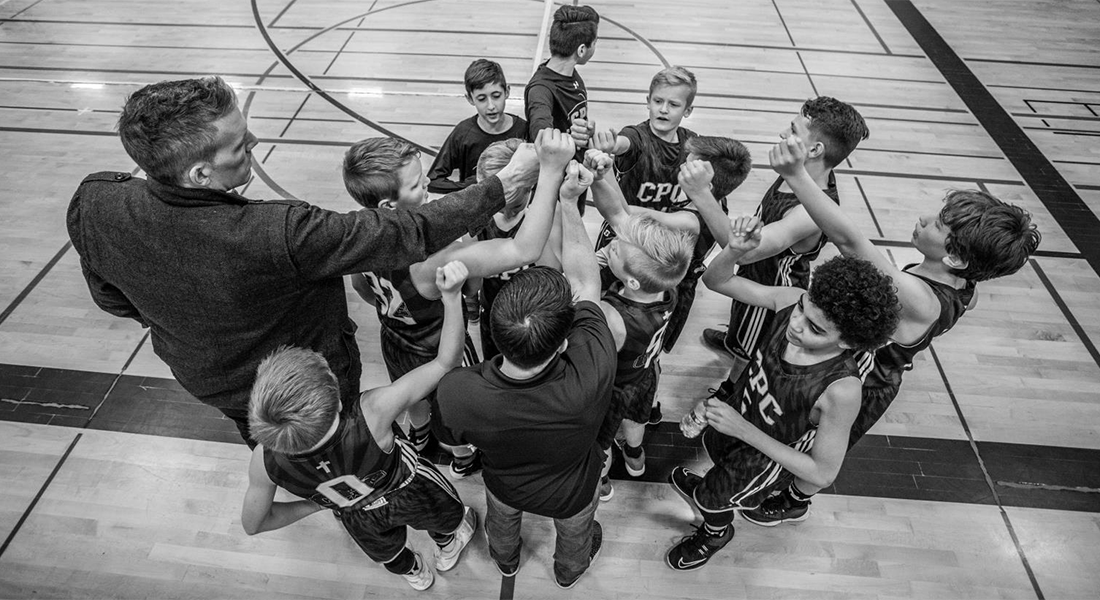
The research project examined the impact different aspects of team environments had on young people's well-being, motivation, and continuation in sports. The results provided insight into how to increase well-being, motivation, and continuation in youth sports, and thus reduce the dropout rate in the associations.
Publications
Nielsen, G., Wikman, J. M., Appleton, P. R., Bentsen, P., & Elsborg, P. (2024). Predicting adolescents' continuation in club sports: A prospective cohort study of the importance of personal and contextual motivational factors in five sports in Denmark. Scandinavian Journal of Medicine and Science in Sports, 34(4), [e14616]. https://doi.org/10.1111/sms.14616
About the project
Many members of Danish sports associations dropped out during their teenage years. This was problematic because participation in club sports had positive impacts on quality of life, physical and mental health, as well as social integration and involvement in club democracy. The purpose of this project was to identify factors that were decisive for young people's continuation in sports and to contribute to the work of sports associations and federations to support the well-being of young people and reduce the dropout rate among young people.
Data was collected from approximately 10,000 young athletes in approximately 2,000 associations in 9 sports federations. Measurements of well-being and motivation in sports, as well as the team's environment, were collected one year, and follow-up data about continuation and dropout was collected the following year. This allowed for an analysis of the impact different social environmental factors, experiences, and types of motivation in sport had on young participants' continuation.
The study's particular strength was that it was based on sports and motivational psychology theories, concepts, and questionnaire measurements, which had been developed and tested over a long period of years and had proven to be able to explain young people's well-being in and continuation of sports outside of Denmark. Another strength was that the project examined the impact of factors in club and team environments, which had proven possible to implement in practice in sports associations. This knowledge about what already worked in relation to creating well-being, motivation, and continuation enabled implementable practical recommendations for the sports associations and confederations.
The 9 sports associations that participated in the project were Badminton Denmark, Denmark's Basketball Association, Danish Football Association, Danish Gymnastics Association, Danish Handball Association, Danish Equestrian Association, Danish Skating Association, Danish Swimming Association, and Danish Tennis Association. In addition to the 9 specialist confederations, the project was supported by Denmark's Sports Confederation and DGI.
Involved in the project
Glen Nielsen, Associate Professor, Department of Sports and Nutrition, University of Copenhagen.
Peter Bentsen, Center Manager for Clinical Research and Prevention Bispebjerg and Frederiksberg Hospital. Affiliated Professor, University of Copenhagen.
Peter Elsborg, PhD, postdoc, Health Promotion, Steno Diabetes Center Copenhagen.
Funded by
The Ministry of Culture's Research Pool.
Contact
Associate Professor Glen Nielsen
The aim is to develop and investigate new ways of carrying out team game activities for students in secondary education, with the purpose of creating and establishing inclusive and well-being-promoting youth communities in different youth education settings.
This is done through co-creation workshops and Participatory Action Pesearch approaches in 6 different school contexts
Funded by
Contact
PhD student Adam Steen Rønlund
Embodiment, culture and education
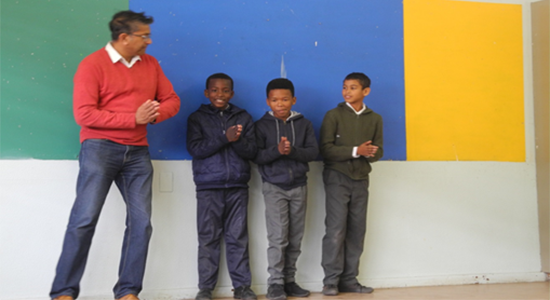
The research project aims to develop models for integrating arts in the curriculum in Denmark and in South Africa building on partnerships of ambassador teachers from different schools through so-called ”Teacher Twinning.”
The project will explore and document what value arts-integrated teaching building on ideas and methods developed in previous school projects in collaboration of the project partners has to teachers, children and for reaching objectives of national curricula.
The project will produce knowledge about how to stimulate the implementation of arts and cultural education in reaching the UN Sustainable Development Goals 2030, specifically goal 4.7. about quality education. Moreover, it will develop new methods for teaching in multicultural settings based on arts-integration in various school subjects.
The outcome of the project will also include teaching material and workshops for teachers that can be implemented at national level in both countries.
Publikationer
Svendler Nielsen, C. & Samuel, G.M. (2025). Embodied-artistic pedagogy creating hopeful educational spaces in times and places of crises and trauma. International Journal for Research in Cultural, Aesthetic and Arts Education, 2(1).
Samuel, G.M. & Svendler Nielsen, C. (2022). Desiderata: Dancing social cohesion in Cape Town (pp. 146-158). In C. C. Carter & R. Benza Guerra (Eds.), Educating for peace through theatrical arts: International perspectives on peacebuilding instruction. London: Routledge.
Samuel, G.M. & Svendler Nielsen, C. (2022). Conversations: Changing life perspectives through a microtopia of integrated arts education in a South African Primary School (pp. 109-122). In K. Jones (Ed.), Doing Performative Social Science: Creativity in doing research and reaching communities. London: Routledge.
Svendler Nielsen, C. & Samuel, G.M. (2022).’É tudo uma questão de arte!’ Atravessar as fronteiras da academia e da práctica artística num projeto educativo integrado na área das artes na Africa do Sul. L. Veloso & C. Quintão (Eds.), Sábado: Aprendizagens no cruzamento entre arte, educacão e cidadanía (pp.136-145). Alkantara & Fundacão Calouste Gulbenkian.
Collaboration partner
University of Cape Town, South Africa
Funded by
Project period: 2021 - 2025.
Contact
Associate Professor Charlotte Svendler Nielsen
The research project builds on this earlier project
Arts-integrated and intercultural learning focusing on sustainable development in Cape Town and Copenhagen
The project explores connections between awareness of climate change, culture and dance and visual arts as different forms of expression.
It involves school children in Cape Town and Copenhagen as well as artists, teachers and researchers from both cities.
It is related to the UN 2030 Goals for Sustainable Development as it focuses on how culture and nature are phenomena that influence each other, what are similarities and differences South and North of the Equator.
The project seeks to answer what children can learn through such collaborations about themselves, others and their surroundings and how connections can be created between the children’s experiences and expressions, both in artistic formats and as alternative forms of reflection.
Publications
Svendler Nielsen, C., Hartman, L. & Samuel, G.M. (2022). An embodied perspective of resilience: The impact of integrated arts education on experiences of South African primary school children post COVID-19 lockdown. Culture Crossroads, 20, 20-45.
Wilson, L., Vedel, K.A., Samuel, G.M. & Svendler Nielsen, C. (2021). Getting to the core of Red Apples-Green Apples: A Dance and Visual Arts Learning Project between South Africa and Denmark. Intercultural Education, 32(6), 682-690.
Svendler Nielsen, C., Samuel, G.M., Wilson, L. & Vedel, K.A. (2020). ‘Seeing’ and ‘being seen’: An embodied and culturally sensitive arts-integrated pedagogy creating enriched conditions for learning in multi-cultural schools. International Journal of Education and the Arts, 21(2), 1-23.
Svendler Nielsen, C. & Hartman, L. (2020). Advancing our futures – educational potential of interdisciplinary artistic projects to children ‘at-risk’ in Denmark and South Africa. Policy Futures in Education, 18 (3), 410-431.
Svendler Nielsen, C. & Samuel, G.M. (2019). Intercultural teaching and learning in dance and visual arts: Co-creating an artistic-educational space among South African children and artist-educators from Cape Town and Copenhagen. International Journal of Critical Pedagogy, 10(1), 98-117.
Svendler Nielsen, C., Samuel, G.M., Vadim, P., Hartman, L., Hartzenberg, F. & Gerlach-Hansen, O. (2021). A microtopia of arts education: International sustainable development policy brought to live in an educational project involving institutions in South Africa and Denmark (pp.173-193). In E. Wagner, C. Svendler Nielsen, L. Veloso, A. Suominen & N. Pachova (Eds.), Arts, sustainability and education. Yearbook 2 of the European Network of Observatories in the Field of Arts and Cultural Education(ENO). Singapore: Springer Nature.
Svendler Nielsen, C., Samuel, G.M., Vadim, P., Hartzenberg, F. & Hartman, L. (2020). ‘It’s all about art!’ Crossing borders of academia and arts practice in an arts-integrated educational project in South Africa. In C. Svendler Nielsen & S. Burridge (Eds.), Dancing across borders: Perspectives on dance, young people and change (pp.17-30). London: Routledge.
Svendler Nielsen, C. & Samuel, G.M. (2019). Dance pedagogy and arts integration: Access and inclusion. In S. Friedman (Ed.), Dance, (e)merge, Theatre: Proceedings of the 10th Confluences Conference 29-31 August 2019, University of Cape Town, South Africa (pp.163-171). Cape Town: Centre for Theatre, Dance and Performance Studies.
Partners
University of Cape Town School of Dance
Peter Clarke Art Centre i Cape Town.
Funded by
Danish Agency for Higher Education and Science
Danish Agency for Culture and Palaces
Municipality of Copenhagen
Project period: 2017 - 2020.
Contact
Associate Professor Charlotte Svendler Nielsen
This project focus on the ways in which democratic, empowering, and challenging dance courses may advance university students’ dance skills, pedagogic consideration, existential learning processes, and embodied leadership with regard to their roles as future physical education teachers.
These movement psychological-inspired transformational and empowering educational methods may also give possibilities regarding broader educational issues.
Publications
Winther, H. (2020). Let's move: Embodiment, leadership, and dance in education. I M. B. Tin, F. Telseth, J. O. Tangen, & R. Giulianotti (red.), The Nordic Model and Physical Culture (p. 51-67). Routledge. Routledge Research in Sport, Culture and Society.
Winther, H. (2018). Dancing Days with Young People: An art-based coproduced research film on embodied leadership, creativity, and innovative education. International Journal of Qualitative Methods, 17/1 (Special Issue: Exploring Innovations in Elicitation Methods), p. 1-10.
Dancing Days with Young People
The film "Dancing Days with Young People" follows one teacher, 21 students and 200 high school students through an innovative and challenging teaching course that focuses on dance, creativity, body, and leadership.
The documentary lasts 12 minutes and was created in collaboration between film director Helle Toft Jensen and lecturer Helle Winther.
Funded by
Spor Media
Project period: 2018 - 2026
Contact
Associate Professor Helle Winther
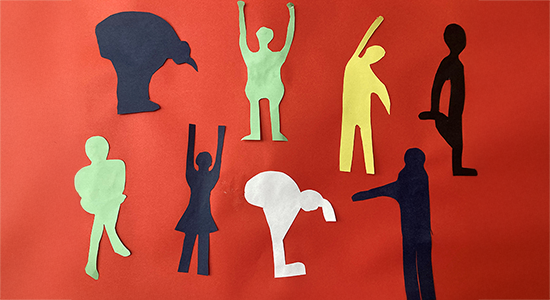
The research project Embodied Language Learning through the Arts (ELLA) explores how language, artistic activity and embodied learning can be intertwined and how embodied language learning through the arts can contribute to meaningful changes in educational practices.
The ELLA project includes three subprojects: Early ELLA, Culturally Diverse ELLA and Multiprofessional ELLA. University of Copenhagen is involved in Multiprofessional ELLA.
Publications
Anttila, E., Hannuksela, R., Jusslin, S., Korpinen, K., Lehtinen-Schnabel, J., Lilja, N., Svendler Nielsen, C. & Siljamäki, M. (2024). Embodied Language Learning through the Arts: Insights, results, and policy recommendations/Kehollisuus ja taide kielen oppimisessa: Oivalluksia, tuloksia ja suosituksia/ Kroppsligt språklärande genom konst: Insikter, resultat och policyrekommendationer. University of the Arts Helsinki.
Jusslin, S., Korpinen, K. Hanuksela, R. & Svendler Nielsen, C. (2024). Embodied and arts-integrated languages and literacies education in class teacher education: Becoming-teachers’ diffractions of opportunities-and-challenges. Journal of Applied Language Studies, Special Issue: Arts and embodiment in language education, (18)3, 125-152
Partners
University of the Arts Helsinki (lead partner)
Åbo Akademi University
University of Turku
Jyväskylä University
Tampere University
Norwegian University of Science and Technology
University of Copenhagen
Funded by
KONE Foundation
Project period: 2021 - 2025.
Contact
Associate Professor Charlotte Svendler Nielsen
A study of lived experiences from ball-game education in a university program in Denmark
The PhD project is based on a hermeneutic phenomenological study of lived experiences (van Manen, 1990) from ball game education in a university program in Denmark.
The aim of the thesis is to illuminate students’ experiences and to use the insights to develop didactic focus points for the teaching of ball games in the future. This is done through observation, interviews and lived experience descriptions from an educational setting involving many students and over a number of years.
The analysis will lead to insights of themes that are key to understanding a diverse range of students’ experiences, from those who have experience in ball games to those who do not and find the area challenging for different reasons.
Through the creation of awareness of this wide range of different experiences and didactic focus points that can help to involve all students in meaningful ways, the research has the potential to give more students positive experiences.
It also has potential to support future students including in other PE programs to become more reflective about the variation of experiences in the field of ball games which possibly can lead to sustained involvement in the field for more and support better ball game teaching of future teachers in high schools.
Contact
Steen Ingemann Jørgensen
PhD student
The aim of this project is to explore how gymnastics is taught in the BA programmes in PE at Danish universities, and how this connects to the practical reality of the students’ future work life – especially as high school teachers.
Central research questions
- How is gymnastics taught in the BA programmes in PE at Danish universities and why?
- How does the curriculum connect to the practical reality of the students’ future work life – especially as high school teachers?
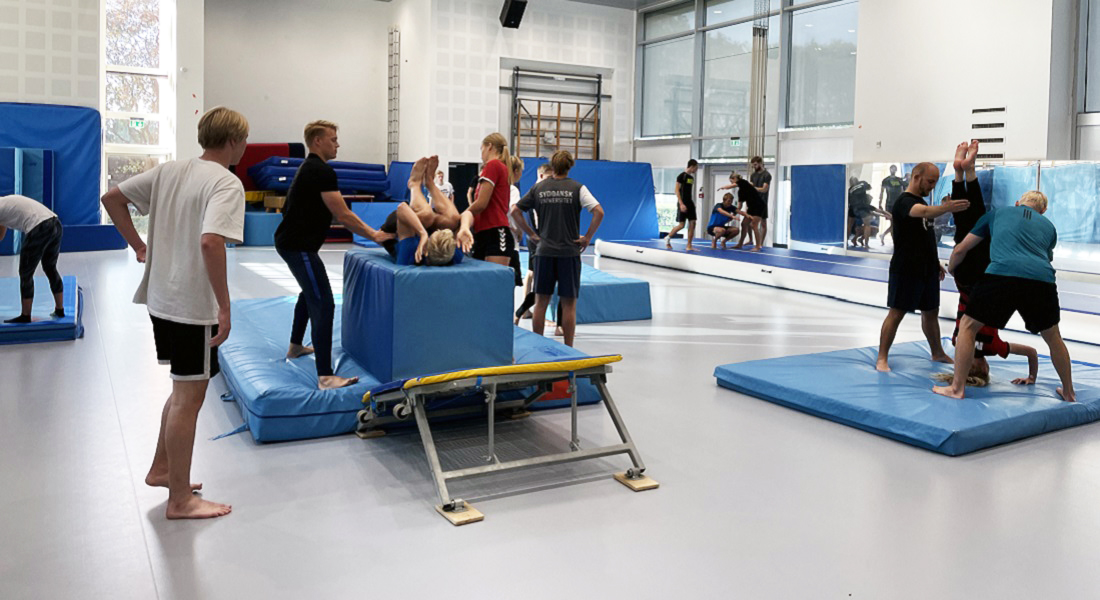
Gymnastics has historically played a large role in the development of PE in Denmark. Today gymnastics is still a central part of the national curriculum for PE in primary and lower secondary school, but in high school PE gymnastics is optional and can be included as part of the mandatory subject area “classical and new sports”.
At the four Danish universities that have a BA program in PE gymnastics is part of the mandatory curriculum, but the emphasis on it differs. There is no universal definition of gymnastics, but the focus of this study lies mainly on apparatus work.
The aim of the project is to explore how gymnastics is taught in the BA programmes in PE at Danish universities and why, as well as how the curriculum connects to the practical reality of the students’ future work life – especially as high school teachers.
The analysis applies a combined sociological and pedagogical perspective, drawing theoretical inspiration from, among others, Norbert Elias. Qualitative methods are used for data collection in this project (i.e. interviews, observations, and document analysis).
This project will contribute with specific knowledge about
- the gymnastics curriculum in the BA programmes in PE,
- the connection between theory and practice in PE,
- research based teaching in practical courses in BA programmes in PE, and
- the interplay between university education and labour market needs.
The project started in October 2020 and is expected to be completed in late 2025.
When articles related to the project are published, they will be featured on this page.
Contact
Andorra Lynn Jensen
PhD student
Research Publication Quality Criteria
The section aims to publish its research according to highest possible national and international standards. The section’s strength is in its multi- and inter-disciplinarity in the social science and the humanities concerning movement, exercise and sport. Its publishing strategy therefore reflects this strength. Our publishing channels include international and national peer reviewed journals, as well as books or book chapters published by reputable academic publishing houses.
Whilst we recognise the importance of widely utilised publishing metrics in relation to quality standards in scientific research, we utilize these metrics with caution. Therefore, these guidelines define the section´s ideals for quality assessment of the ways in which we disseminate our academic research:
- We consider employment of a thorough and rigorous peer review process a precondition for high quality research, within which our research is critically assessed by other scholars and peers. We consider this widely accepted measure of quality to be a welcome practice that helps us improve our work.
- We consider the employment of rigorous, anonymous peer review to be a precondition of quality, and therefore we avoid publishing in ‘grey-zone’ or predatory journals. We consider criteria for rigour to include the employment of thorough peer review processes (including the possibility of rejection of manuscripts), and which offer transparent and open processes for publication.
- We seek to publish with, speak to and convince pluralistic and diverse academic societies, rather than constrain ourselves to ‘closed communities’ that tend to isolate themselves within academia. Our ambition remains to engage with scholars who may not be familiar with our methodologies, subject matter or approaches, or who may not share our scientific philosophies, in order that our contributions can strengthen and develop broader research fields.
- We seek to balance and support publishing in Danish as well as English (and other languages), provided that quality assessment standards (e.g. peer review) are maintained at a high level during the publishing process.
- Alongside and in supplement to scientific publication in the highest possible standard of a given sub-field, we acknowledge that criteria for impact and quality can differ, particularly where research either seeks to engage with a specific scholarly or broader community, or an audience of practitioners. In such cases, we seek to gain evidence of the impact of our work, whilst continuing to emphasize scientific rigour in how we assess research quality. We understand scientific impact in relation to;
- The significance of our scientific work, or the degree to which impact enables, enriches, influences, informs or changes the performance, policies, practices, education programmes, products, services, understanding, awareness or well-being of the beneficiaries, and
- The reach of our scientific work, or the extent and/or diversity of the beneficiaries of the impact, as relevant to the nature of the impact, inclusive of societal impact.
Section members
| Name | Title | Phone | |
|---|---|---|---|
| Search in Name | Search in Title | Search in Phone | |
| Adam B. Evans | Associate Professor | +4535331336 | |
| Andorra Lynn Jensen | External, Ph.d Student | +4535322429 | |
| Anna Stage Hansen | Enrolled PhD Student | ||
| Annette M Dornonville de la Cour | Part-time Lecturer | +4520658410 | |
| Charlotte Svendler Nielsen | Associate Professor | +4535320830 | |
| Glen Nielsen | Associate Professor | +4535320869 | |
| Helle Winther | Associate Professor - Promotion Programme | +4535320806 | |
| Henriette Folkmann Hansen | Part-time Lecturer | ||
| Laila Ottesen | Associate Professor | +4535321741 | |
| Maise Johansen | Teaching Assistant | ||
| Marie Birch Overbye | Part-time Lecturer | ||
| Marie Caroline Vermund | Industrial PhD | +4535332121 | |
| Mette Lindholm Kurtzhals | PhD Fellow | +4535327681 | |
| Mikkel Sørensen | Teaching Associate Professor | +4535320802 | |
| Paulina Sander Melby | Postdoc | +4527266039 | |
| Reinhard Stelter | Professor Emeritus | +4535320866 | |
| Sidse Marie Sidenius Bestle | Postdoc | +4535332465 | |
| Signe Engdal | PhD Fellow | +4535336232 | |
| Steen Ingemann Jørgensen | PhD Student | ||
| Stefano De Dominicis | Associate Professor | +4535326016 | |
| Troels Thorsteinsson | Part-time Lecturer | +4521608935 | |
| Ulrik Wagner | Associate Professor, Head of Section | +4535321511 |


